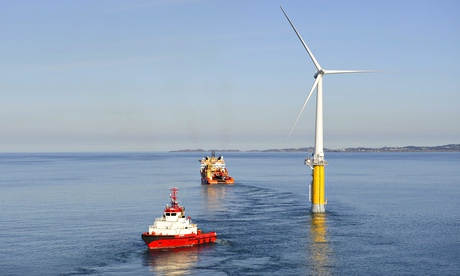
Humankind’s ability to manage climate change is being tested. The Paris climate talks will conclude two weeks from today. Can we get it right this time?
There is no shortage of pessimists. Mark Carney recently spoke of climate change as the “tragedy of the horizon”. Humans have an enormous capacity for failing to do what we know in our hearts we need to. As Ibsen’s Peer Gynt said: “To think it, wish it, even want it – but do it! No, that I cannot understand.”
As head of sustainability at Statoil, a multinational energy company with a Norwegian heritage, I see dilemmas everywhere I look. More energy v less carbon. Cut costs v invest boldly. NGO activism v shareholder returns. Back home, my children encourage me to keep pushing the sustainability agenda. You might think my chief executive would prefer me to keep any radicalism under control. After all, surely an oil and gas company wants to continue with business as usual for as long as possible? But this is where it becomes really interesting.
Statoil’s CEO, Eldar Sætre, has issued a challenge to the 22,000 employees in the company to do more to meet the climate challenge: “To succeed in the future, we need a mindset of radical change. I want Statoil to be a company recognised for shaping the future of energy.” The message is clear: the status quo will not bring about the change we need.
This represents an amazing opportunity for us to make a difference. I’d like to share some of the thinking in our company about how to speed the transition towards a low-carbon future.
I’ll start with fundamentals. Statoil doesn’t debate climate science. We act on it. The way the world meets its need for energy today will not limit the increase in global temperatures to 2C. We recognise that coal, oil and gas are major contributors to the world’s total greenhouse gas emissions.
But changing the world’s energy mix is not easy. It will take time. Even with an exponential increase in investment in alternative energy, forecasts predict that fossil fuels will still make up a large share of the energy mix in 2040. Less than the 80% share of today, but almost certainly well over 50%.
To supply more energy for a growing population while emitting less greenhouse gas requires a collective leap of the imagination and technology development. We all share this responsibility. Governments need to implement visionary policies. Consumers need to change the ways they use energy. And energy companies like mine need to continuously drive for operational efficiency to lower emissions and costs. We need emission-reduction targets, roadmaps and transparent reporting on progress. We need to help create the solutions that our societies need.
That is why we are calling for an ambitious outcome in Paris. As an energy provider, we want an agreement that all countries sign up to: an agreement that contains a robust review mechanism, that encourages cooperation between carbon markets, that sets a clear direction for the next 30 years and more – and that creates a global step change in efforts to tackle climate change and spur the energy transition.
Putting a price on carbon is probably the most efficient policy instrument to accelerate a change in the energy mix and to shift behaviour among both producers and consumers. The carbon tax paid by Statoil in Norway has for decades been the highest in the world. That has helped us to be one of the most carbon-efficient producers of oil and gas in the world. We know it works.
Let’s be precise about the challenges. The concept that the world has a finite carbon budget that it can burn before climate change reaches dangerous levels has helped our understanding of the problem. Yet not all fossil fuels are carbon equal. Coal emits twice as much CO2 as natural gas when consumed. So switching electricity production from coal to gas is an available and cost-effective measure for governments that will lower emissions immediately. For example, replacing coal with gas in the power sector will reduce emissions in the EU by around 450m tonnes of CO2 a year. That is a lot.
The agreement in Paris matters enormously. But Statoil is already participating in the energy transition. We are one of the UK’s largest gas suppliers. One in five UK homes cook on our gas. And our offshore wind farms will soon supply more than 600,000 UK homes with energy. And that’s just the beginning. We’ve just announced a truly innovative floating wind-park off the coast of Scotland. In short, we aspire to be a great renewables company as well as a great oil and gas company.
Pessimism will not bring about radical change. And pessimism will not orient us towards the solutions for climate change. We are optimistic. We can do this.

